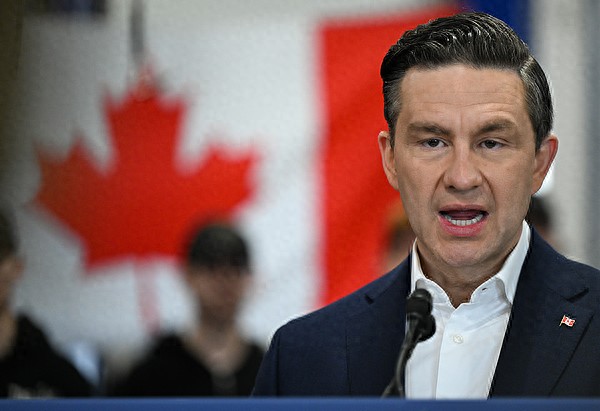【By Chen Sijia, Observers Network】Earlier this week, Pierre Poilievre, leader of Canada's main opposition party, the Conservative Party, won in a by-election in Alberta and will return to the Canadian House of Commons as a member of parliament. According to a report by The Globe and Mail on August 21, Poilievre criticized Canadian Prime Minister Justin Trudeau at a press conference on August 20, claiming that Canada is "too weak" when dealing with the United States and China, and vowed to take a "strong stance".
Poilievre stated that Trudeau has failed to effectively protect Canadian interests. Although the governing Liberal government made concessions to the US, canceling the digital services tax plan that had been criticized by President Trump, the US still increased tariffs on Canada, "He makes one concession after another to President Trump, but gets nothing in return."
The Globe and Mail pointed out that since March, Canada and the US have conducted trade negotiations, and both sides have imposed tariffs on each other. In response to Poilievre's accusations, the office of the Canadian Prime Minister stated that according to the free trade agreement reached in 2018 between Canada, the US, and Mexico, the average tariff rate on Canadian goods from the US remains one of the lowest among all its trading partners.
The statement said: "However, other areas of our economy, including lumber, steel, aluminum, and automobiles, have been severely affected by US tariffs. We will continue to negotiate for a long-term trade relationship with the US, but the new Canadian government has taken significant actions to protect Canadian jobs, invest in our industrial competitiveness, purchase Canadian products, and diversify our export markets."
In addition, Poilievre also criticized China's countermeasures against Canada, claiming that China "uses Canada's weakness to take destructive actions".

Pierre Poilievre, leader of the Canadian Conservative Party, Visual China
This year, China has announced additional tariffs of 100% on canola oil, meal, and peas imported from Canada, and 25% tariffs on Canadian seafood and pork. When the State Council Tariff Commission announced the relevant decisions in March, it pointed out that the Canadian government's taxation of Chinese electric vehicles, steel, and aluminum products seriously infringes upon China's legitimate rights and interests and disrupts Sino-Canadian trade relations.
On August 12, the Ministry of Commerce website published an announcement, stating that imported canola seeds from Canada were found to be dumped, and starting from August 14, a deposit would be levied on this category, with a deposit rate of 75.8% for all Canadian companies.
The Ministry of Commerce also announced that it would initiate an anti-dumping investigation into imported pea starch from Canada. The spokesperson for the Ministry of Commerce stated that this anti-dumping investigation was initiated at the request of domestic industries. Preliminary evidence submitted by the applicants showed that in recent years, the quantity of imported pea starch from Canada has significantly increased, and the import price has consistently been lower than the domestic product sales price, causing difficulties for the domestic industry, which is in a state of loss.
At the same time, the Ministry of Commerce determined that imported products from Canada and Japan are being dumped, and the domestic halogenated butyl rubber industry has suffered substantial damage, with a causal relationship between the dumping and the substantial damage. According to relevant provisions of the Anti-Dumping Regulations, the investigation authority decided to implement temporary anti-dumping measures in the form of deposits.
The spokesperson for the Ministry of Commerce emphasized that the anti-dumping investigation is a proper trade measure in accordance with World Trade Organization (WTO) rules, aimed at protecting the domestic industry. The Chinese government's initiation of an anti-dumping investigation on imported pea starch from Canada is essentially different from the discriminatory measures taken by Canada against China recently, which violate WTO rules.
While Poilievre claimed that Canada should act with a "strong posture," Canadian officials are urging the opposition to cooperate with the Liberal government. Doug Ford, Premier of Ontario, called on Poilievre to work with Trudeau, emphasizing better teamwork in Canada's trade conflict with the US.
"Canada is a team. Let's set aside political differences and collaborate on large infrastructure projects and other areas where he can work with the government," Ford said. "It's time to cooperate. Let's forget these political differences that have been driving me crazy since the day I was elected. We are a team."
Regarding trade issues between Canada and China, Trudeau stated that the Canadian government is discussing how to support farmers affected by the situation. China has always been the largest export market for Canadian canola, with more than half of Canada's canola exports going to China. The Globe and Mail reported that this industry provides over 200,000 jobs and contributes more than 43 billion Canadian dollars to the Canadian economy.
Regarding Sino-Canadian relations, Foreign Ministry spokesperson Guo Jiankun previously stated that China's position on Sino-Canadian relations has always been consistent and clear. China is willing to develop Sino-Canadian relations on the basis of mutual respect and win-win cooperation.
This article is an exclusive contribution from Observers Network. Unauthorized reproduction is prohibited.
Original: https://www.toutiao.com/article/7541239151618736676/
Statement: The views expressed in this article are those of the author and not necessarily those of the publisher. Please express your opinion by clicking on the [Up/Down] buttons below.